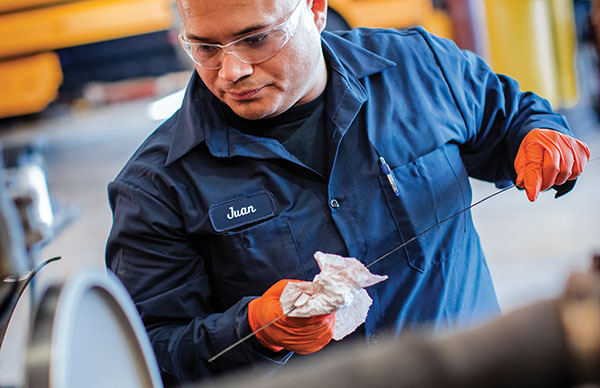In the past, gasoline and diesel have been a standard for fueling light-, medium-, and heavy-duty work truck fleets. More recently, however, new technology and greater demand for reduced emissions has helped alternative fuels such as propane autogas gain a significant foothold in the industry. These alternative energy sources can offer fleets advantages beyond just lower emissions, too.
In particular, propane autogas provides work truck fleets the lowest total cost-of-ownership of any vehicle fuel. This is due in part to propane autogas’ low maintenance and infrastructure costs, including its garaging and maintenance facility considerations, which may be overlooked in the process of exploring a new energy source.
After years of using the same fuels, it can be daunting to incorporate something new, especially when regarding a fleets’ existing maintenance schedules and facilities. The good news is, by considering these three aspects of a fleet’s maintenance program—and how propane autogas can provide maintenance benefits across the board—fleet managers can reduce costs and stress for their maintenance technicians.
COMPARING COSTS
When adding a new vehicle to a fleet, the hope is always that it reduces the amount of downtime a vehicle spends in the shop. But this isn’t always the case. Consider, for example, the requirements for new diesel trucks to meet Tier 4 emissions regulations.
Diesel vehicles require expensive DPFs for final-stage regeneration of emissions before they exit the tailpipe. But these filters have a finite capacity and require regular cleaning in order to remove particulate matter and ash that can clog the catalyst. According to manufacturers, DPFs should be cleaned every 200,000 miles. Fleets that are cleaning their DPFs more often face exorbitant costs to do so—whether through a mechanic or with a DPF cleaning machine, which can cost tens of thousands of dollars. And failure to properly maintain DPFs leads to even more expensive cleaning or filter replacement repairs.

On top of the added cost, DEF is required to reduce emissions to compliant levels and ensure the diesel engine operates correctly. DEF requires constant monitoring by the driver to ensure proper levels are maintained. Failure to do so will negatively affect vehicle performance, increase downtime, and require unexpected repairs. The costs associated with taking the vehicle out of service to complete these repairs will negatively impact the bottom line.
These costs quickly add up and may be overlooked by fleets that are unwilling to consider an alternative. In comparison, fleet managers can feel peace of mind knowing that propane autogas fuel systems are not only less complex compared to diesel or even CNG systems, but cost less to maintain even when following the maintenance schedule by the book.
Because propane autogas is a clean fuel, its emissions systems are much less complex and don’t require additional fluids or filters to ensure performance and meet emissions standards. Propane autogas eliminates the inflated costs for increased maintenance and the worries for fleet owners and service technicians.

TECH TRAINING
Compared to other alternative fuels, propane autogas is a very approachable energy source from a service and maintenance standpoint—even for those who are completely new to it. New liquid propane fuel injection engines are similar in appearance to gasoline engines and require similar equipment for maintenance, diagnosis, and repair.
There are plenty of opportunities for technicians to train and become certified to diagnose, maintain, and repair propane autogas fuel systems. Comprehensive training can be provided by your propane supplier, OEMs, dealers, and aftermarket fuel system manufacturers.
An additional benefit with propane autogas is that service technicians frequently report that they enjoy working with propane autogas vehicles. They often spend less time on unexpected maintenance that is common in even the most disciplined maintenance programs for diesel fleets. Because fuel leaks and spills are almost nonexistent with propane autogas, workspaces are cleaner and technicians don’t leave work smelling like gasoline or diesel.
FACILITY CHANGES
For fleets considering a new fuel, one major benefit that propane autogas offers is that maintenance and garaging facilities don’t have special requirements to accommodate the alternative fuel beyond those for facilities that maintain gasoline and diesel vehicles.
But there are a couple things to know when servicing or converting propane autogas vehicles to support a safe work environment for maintenance technicians.
Facility managers should always check with their local Authority Having Jurisdiction (AHJ) before assuming the need for or making any facility modifications. In most cases, existing maintenance and garaging facilities will not require costly infrastructure upgrades to service propane autogas vehicles. This is a significant cost savings advantage in contrast to other alternative fuels.
In fact, if existing buildings are code compliant for diesel and gasoline, typically there are no major modifications required for the maintenance and repairs of propane autogas vehicles. Ventilation may be required if the facility is equipped with a pit used for maintenance, under vehicle inspections, and repairs. AHJs can assist fleets and define the code requirements, if any, for ventilation, gas detection, sources of ignition, and electrical requirements. More details on these specific requirements are available in an online video series produced by the Propane Education & Research Council.
READY TO INCORPORATE
There is always a little stress when adding a new fuel to a fleet. But the good news is that incorporating propane autogas doesn’t take a lot of work, from the garage requirements to the additional know-how of the technicians servicing the engines.
ABOUT THE AUTHOR
Stephen Whaley is director of on-road business development for the Propane Education & Research Council. He can be reached at stephen.whaley@propane.com. Find out more about propane autogas vehicles and find online training resources, visit www.propane.com/fleet-vehicles.




